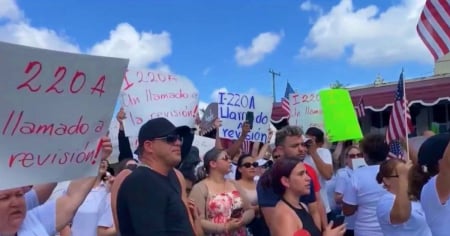
Related videos:
Miami is facing an unprecedented crisis in its immigration courts, with a record backlog of pending cases that directly affects thousands of migrants in Florida.
According to a report from Syracuse University, based on data from the Transactional Records Access Clearinghouse (TRAC), as of December 2024, Florida had 178,709 pending cases, of which 113,239 were in Miami.
Nationwide, the total figure exceeds 3.7 million cases, reflecting the collapse of the immigration judicial system in the United States.
Cubans on the waiting list: Over 41,000 cases just in Miami
According to the TRAC analysis, Cuba ranks fifth among nationalities with the most pending asylum applications in the U.S., with a total of 83,066 cases.
However, when examining the data from Miami, Cubans lead the list with 41,171 open cases.
They are followed by citizens from Venezuela (16,783), Haiti (11,573), and Nicaragua (11,407).
In this regard, Miami solidifies its status as the city with the highest accumulation of cases in Florida and the most congested jurisdiction in the entire country, which means that thousands of Cubans continue to wait for answers in a system that has already exceeded its operational capacity.
This backlog has created deep uncertainty for thousands of immigrants seeking to regularize their status in the country.
A system collapsed due to a lack of judges
The report details that the majority of pending cases correspond to defensive asylum applications, meaning those submitted in response to a deportation proceeding initiated by the Department of Homeland Security (DHS).
In contrast, affirmative requests, which are those submitted to the Immigration Court after being denied by the U.S. Citizenship and Immigration Services (USCIS), represent a smaller proportion.
One of the factors worsening the crisis is the shortage of immigration judges.
According to Telemundo 51, the situation deteriorated further after the firing of more than twenty judges during Donald Trump's administration, raising concerns among experts.
"We are talking, in my opinion, about possibly four or five years before availability in court," said immigration attorney Eduardo Soto, who warned about the seriousness of the issue.
Lawyer Willy Allen also highlighted the magnitude of the delay, mentioning that a Cuban dissident he represents has been in the country for three years and their first hearing is scheduled for 2026.
Impact on the migrant community: uncertainty and risk of deportation
The backlog of cases in the courts has caused desperation among migrants who rely on a favorable resolution to remain in the country.
Such is the case of the Cuban researcher Óscar Casanella, who fled Cuba with his pregnant wife and his four-year-old son in January 2022.
Despite having requested asylum more than three years ago, he has still not had a hearing before a judge.
The expert from the Immigration Policy Institute, Kathleen Bush-Joseph, warns that the court crisis is due to an outdated immigration system with limited resources, which forces migrants with legitimate cases to wait years for a resolution.
This uncertainty is compounded by the risk of deportation for those who have been in the U.S. for less than two years.
The lawyer Cindy Blandón, a migration specialist, explained to CNN that the laws allow for the expedited expulsion of those who do not meet this criterion, so they must take extra precautions to avoid being detained by the Immigration and Customs Enforcement (ICE).
Measures to avoid detention
Amid the increasing arrests by Immigration and Customs Enforcement (ICE), migrants applying for asylum must take precautions to avoid being detained. Some recommendations from experts include:
Avoid unnecessary encounters with ICE agents.
If they are detained, present their documents and exercise their right to remain silent.
Having an immigration lawyer for legal advice.
In Florida, migrants without legal status cannot access driver's licenses or official identifications, which increases the risk of arrest and deportation.
The future of the migration crisis in the U.S.
The accumulation of asylum cases reflects the collapse of the U.S. immigration system.
With Florida as the state with the highest number of pending applications and Miami leading at the state level, thousands of migrants face years of uncertainty as they await a resolution to their cases.
Lawyers and activists have raised awareness about the need for immigration reforms and an increase in the number of immigration judges to alleviate the crisis.
Meanwhile, thousands of Cubans remain trapped in legal limbo, hoping that their cases will be addressed before facing possible deportation.
Frequently Asked Questions about the Immigration Crisis in Miami and Its Impact on Cubans
How many pending cases are there in the immigration courts of Miami?
In Miami, there are 113,239 pending cases in immigration courts, which represents a significant portion of the 178,709 accumulated cases across Florida. This situation reflects a crisis in the United States immigration judicial system, with more than 3.7 million pending cases nationwide.
Why are Cubans the most affected in Miami?
Cubans top the list of nationalities with the most open cases in Miami, with 41,171 cases. The shortage of immigration judges and the system's collapse are factors that exacerbate their situation, forcing thousands of Cubans to wait years for their asylum cases to be resolved.
What risks do Cuban immigrants face in the United States?
Cuban immigrants face the risk of deportation, especially those who have been in the United States for less than two years. They must take extra precautions to avoid being detained by the Immigration and Customs Enforcement (ICE), as they do not have access to driver's licenses or official identification in Florida.
What measures can migrants take to avoid detention by ICE?
To avoid being detained by ICE, migrants should avoid unnecessary encounters with agents, present their documents if detained, and exercise their right to remain silent. Additionally, it is crucial to have an immigration lawyer to receive proper legal advice.
Filed under:





